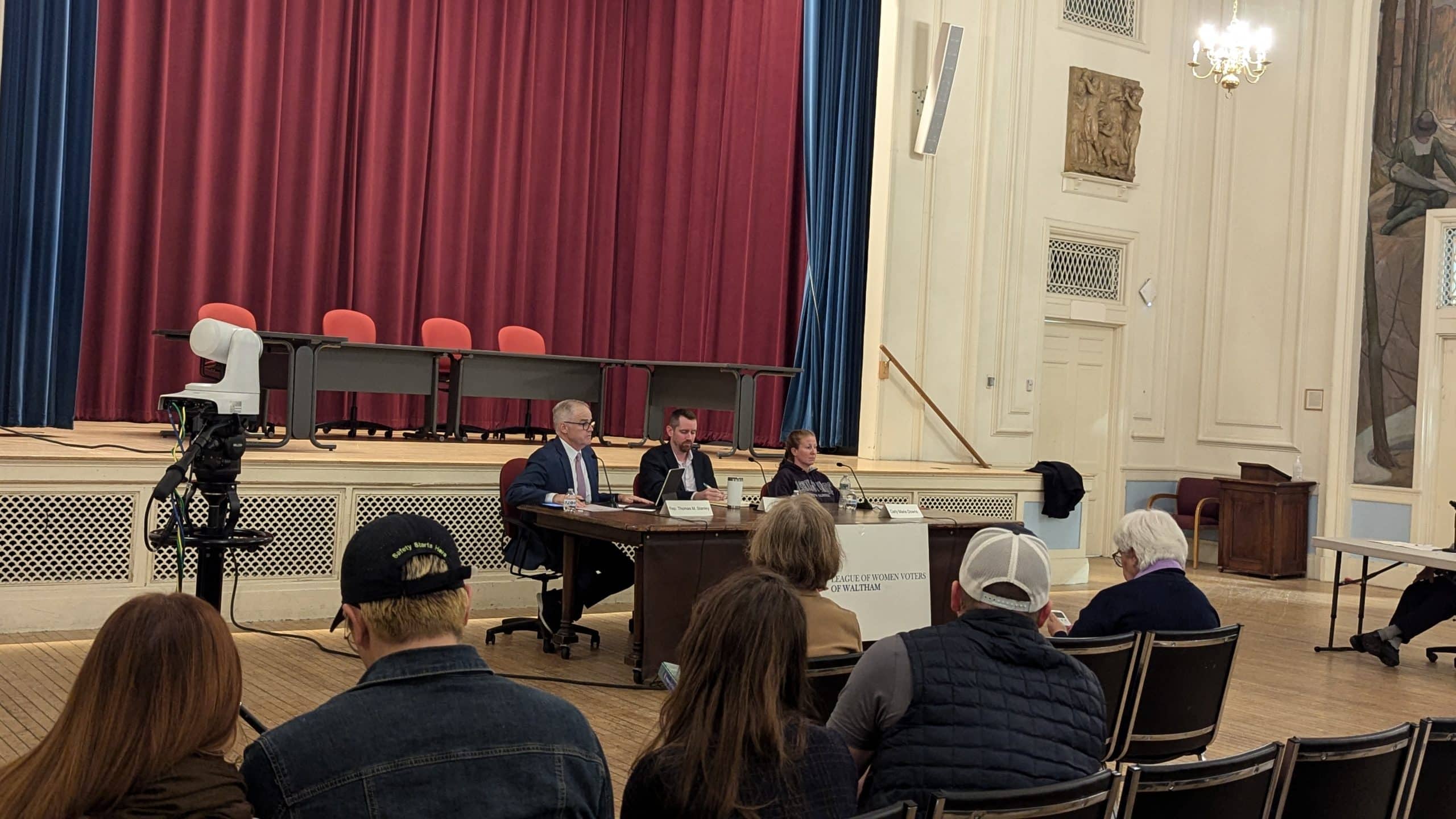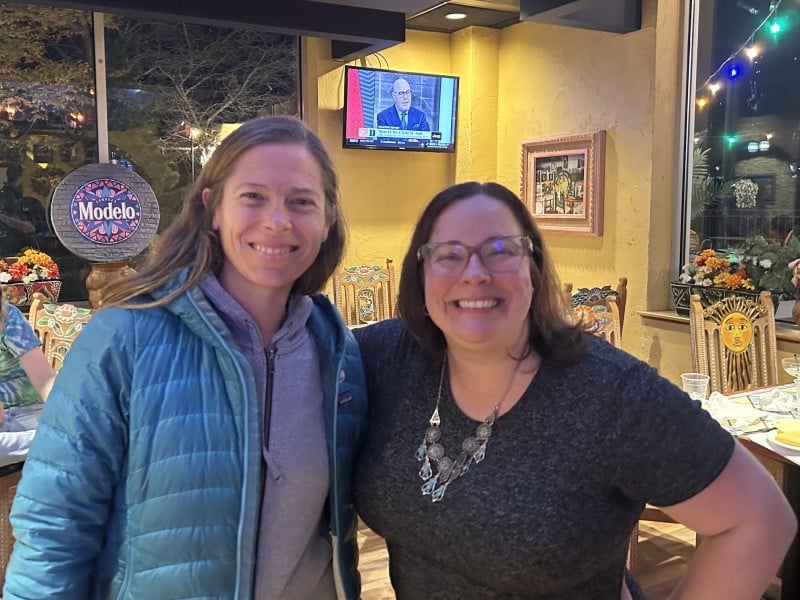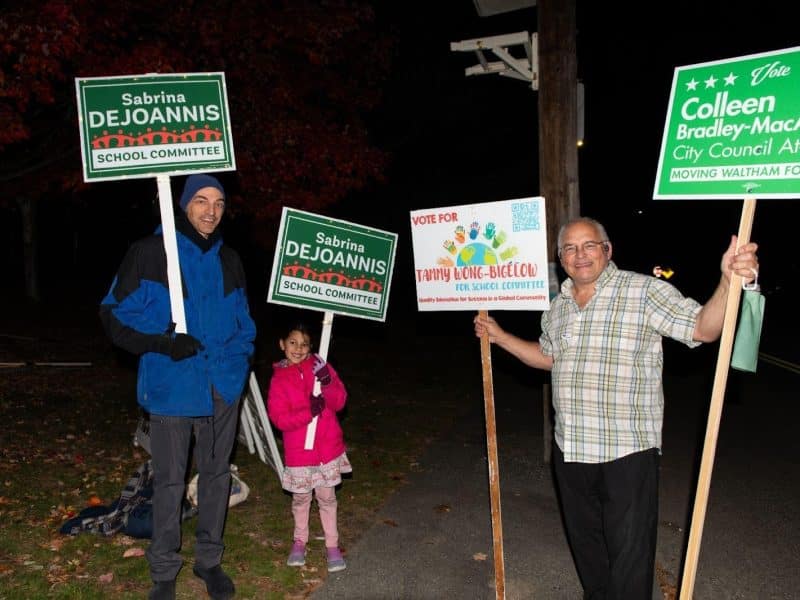Waltham state rep. candidates pitch their experience, plans at recent forum
Waltham’s long-serving state representative, Democrat Tom Stanley, faced off against two challengers.
By AUBREY HAWKE
Waltham Times Contributing Writer

Waltham’s long-serving state representative, Democrat Tom Stanley, faced off against two challengers for the 9th Middlesex District seat at a recent candidates night that featured policy discussions and debate over one another’s positions.
The Oct. 10 event, hosted by the League of Women Voters of Waltham, let challengers Sean Diamond, an independent, and Carly Downs, a Republican, lay out their priorities and share where they see shortcomings in the state’s Legislature.
The event gave Stanley – who has held the position since 2001 – an opportunity to highlight his work and vision for another term.
The evening started with opening statements and then moved into a question-and-answer portion. The League of Women Voters asked the same questions of all three candidates. Highlights of the candidates’ comments are reported here.
Opening statements
Diamond, the first to make a statement, said he was motivated to run for representative in part by what he perceived as a lack of transparency and professionalism in the Massachusetts Statehouse. He said he also sees the need for change as well as to move away from “single-party rule” in the state.
Downs spoke next, saying that she’s running “because I feel the effects of the policies that have been put into play by [Stanley]. I see the madness going on in our town and in our state.” She said she sees businesses struggling, does not like the direction the city and the state are heading, and wants to be a voice for Waltham.
Stanley, who spoke last, highlighted his experience and work in the position. “I have been honored that [the voters] have re-elected me year after year,” he said. “That happens by hard work and campaigning hard.”
Motivation for running for office
The first question asked the candidates why they decided to run for the position.
Downs, who answered first, said she had been educating herself about local political processes and found herself unsatisfied with what she saw going on in the Statehouse and decided to “put her hat in the ring.”
Diamond, who spoke next, also referenced a dissatisfaction with the actions of the current Statehouse. He said he has been working with the Forward Party for the past two years and in that experience concluded that the Statehouse has been “dysfunctional” for decades.
Stanley spoke last, saying he had the knowledge, experience and education required for the role. “It’s a difficult job. You have to know what you’re doing and have built up relationships and know the issues. I know the issues. I get results. I work well with others.”
Priorities
The next question asked the candidates about their legislative priorities.
Diamond said, “My main priority is figuring out how the Legislature actually works. I don’t mean on paper, I mean actually.” Diamond said increasing transparency in the government, introducing election reform, increasing accessibility in Waltham and addressing climate change were also priorities.
Stanley listed accessible and affordable housing as well as “looking out for our seniors” as his priorities. He also responded to Diamond’s claim about a lack of transparency in the Statehouse, explaining that “by the time a bill gets to the floor, it’s been hashed out. Advocates are on board. That’s why it appears that the majority of the House votes in favor of a bill.”
Downs listed ensuring housing for veterans and making Massachusetts a “Constitutional carry” state as top priorities. “We have high crime, but there’s so many layers of red tape that someone has to go through just to be able to have a firearm to be able to defend themselves in their home in case there is an intruder. And even then there’s laws that prevent someone from defending themselves in their own home when someone comes in and intrudes. I don’t think it’s right. It’s very unconstitutional,” she said.
Support for Waltham
Candidates next were asked what they could do for Waltham as a state representative.
Stanley referenced work he already has done as a state representative, such as bringing state money to Waltham to help fund schools and supporting local organizations.
Downs agreed that education funding is a big priority but also spoke about the need for fiscal restraint. “There’s not enough resources and too many people needing assistance. I think there should be more of a vetting process for assistance; too many people are getting them that don’t need them. We all know somebody who takes advantage of the system or fudges the numbers a bit.”
Diamond highlighted the need to secure funding for Waltham to finish projects such as the rail trail that runs through the city. He also said he wants to lower the state’s sales tax.
Committee assignments
The next question asked candidates what legislative committees they would like to join as state representative.
Downs said she doesn’t have any she would like to join.
Stanley said he would like to continue serving on the Elder Affairs Committee.
Diamond said “as an independent candidate it might be very difficult for me to get placed on committees” and would prioritize building working relationships with other state legislators. If able, he said he would like to join committees on climate change, energy and government transparency.
Serving all of Waltham
The next question asked the candidates: “The Fernald and Waltham Fields station are in the legislative district that is primarily in Watertown. What can you, as the representative for the rest of Waltham, do to support these two properties?”
Stanley said he works closely with Rep. John Lawn, whose 10th Middlesex District includes Watertown and part of Waltham, and cited his own role in the purchase of the Waltham Fields Community Farm land from the University of Massachusetts. He also said he looks at issues facing the entire city, not just his district.
Stanley went on to address comments about his involvement on the work to buy the farm. “We were accused of not doing that, and as I said at the time, ‘We are, don’t know where you are hearing these rumors.’ And we have proven that to be true as well. In today’s day and age something goes on social media and rumors fly,” said Stanley.
In responding to the question, Diamond noted that both properties are now owned by Waltham at this point so he’s “not sure” what he can do as state representative to support them. He further said he’d seek to “find funding where funding is needed” and “make sure that there are clauses to make sure that the things that have already been promised by the city are getting done.”
Diamond then responded to Stanley’s comment about rumors, saying “rumors will fly when it’s impossible to find the information about what’s going on in the city.” He also said he thought the Waltham government website lacks adequate information, particularly about public meetings and the Fernald property.
Downs spoke last, saying she was not aware of the issue of Fernald and Waltham Fields Community Farm land being in the Watertown legislative district.
Transparency in government
The next question addressed issues of transparency in the government asking: “The Legislature has kept the committee minutes and votes from being reported to the public. Do you support this? What amount of transparency should the public expect?”
Diamond spoke first saying “It’s worse than you’re making it sound.”
He continued: “To get information about what’s going on in the Statehouse and behind the scenes, many people need to pay for what should otherwise be public information. I do not support everything being made public. There is room for building relationships and negotiations and things like that, but at the very least there should be actual sessions that are held in person, or at the very least in a virtual setting, that has some level of accountability. Not polling by emails and making decisions without actual discussion.”
Stanley responded to the question, saying “If anyone ever asks on how I voted on anything, I provide that information. It’s all public anyway.” He went on to say that he has only had “one or two” people over 24 years ask about votes in committee, which is the “beginning stages of a long trail.”
Downs answered the question, saying she does not support keeping committee minutes and votes from the public. “Every piece of information is important to members of the public, because they need to know everything that is going on. And if we haven’t learned by now, when there are bits and pieces of information withheld from us, we can’t come to a real conclusion. We can’t get all the information to be able to decide what we think on an issue.”
She continued: “Whatever little bits of Information that are withheld from the public, it just makes those that are withholding it look suspicious. And we don’t need any more suspicion from the people to members of our government.”
Legislative actions
The final question asked the candidates “The Boston Globe has been very critical of the Legislature in recent months. One concern is the low number of bills passed and the number left without action. Is this a fair critique? If so, what changes would you make in the next Legislative session?”
Diamond said he has been following the news coverage and has similar concerns about the Legislature.
Downs said she felt the criticism was fair and that the Legislature needs to be able to handle constructive criticism.
Stanley said he did not feel The Boston Globe’s criticism was fair, noting that he felt the paper needs to look at the quality of the bills passed. He also noted that every committee hearing is televised and on the state government’s website.
Closing remarks
The candidates finished the event with closing statements – a segment during which each candidate made a pitch to attendees for their votes on why he or she was the best candidate. The segment also featured some back-and-forth between Downs and Stanley over each one’s comments and positions, with Stanley breaking into Downs’ allotted time to make his points.
The full debate can be watched on demand here.
Voting will be on Tuesday, Nov. 5.




